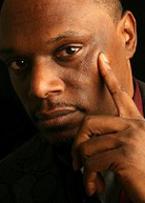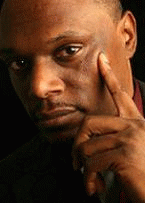
 Connect with Cleo Manago at http://www.amassigroup.com/manago.html and BMX and http://www.bmxnational.com. SHARE |
|
Manago's inventive programs have stimulated the national discourse on HIV/AIDS and Black community health, most notably for appropriate methodologies in mental health and wellness and prevention. He has continually addressed culturally and historically relevant barriers to sexual health, stigma and responsibility, and the challenge of cultural inequity in American society at large. Articulate, opinionated and resolute, Manago has always fought the good fight.
As the founder and CEO of AmASSI Health and Cultural Center, Manago has provided leadership regarding African American health concerns nationally for two decades. Manago was one of the first innovators in the AIDS movement to reveal that psychosocial concerns were a major determinant to assure treatment adherence and preventative behavior modification. He founded the AmASSI National Centers for Wellness and Health in order to provide HIV/AIDS treatment and prevention services utilizing a psychosocial, mental health model that was culturally specific to African American identity. Opening the first Wellness Center in Oakland, California, the AmASSI Centers now provide services in South Central Los Angeles, Atlanta, Georgia and Harlem, New York. Established in 1989, the AmASSI Community Health & Cultural Centers are committed to the wellness, affirmation, education and preservation of African American health and culture.
Cleo Manago is the national organizer and founder of Black Men's Xchange (BMX). BMX is the nation's oldest and largest community-based movement devoted to promoting healthy self-concept and behavior, cultural affirmation and critical consciousness among same gender loving (SGL), gay-identifying and bisexual African-descended males, and allies. The CDC's selection positions BMX alongside other legacy community black organization such as NAACP, the Urban League, the Congressional Black Caucus Foundation and American Urban Radio Networks.
His published works have appeared in The Los Angeles Times, California Voice, Essence Magazine, SBC, Venus, and several other noted publications.
OpEd News Member for 671 week(s) and 3 day(s)
2 Articles, 0 Quick Links, 0 Comments, 0 Diaries, 0 Polls
Articles Listed By Popularity
List By Date
List By Date
SHARE  Friday, July 1, 2011
Friday, July 1, 2011
Leader of an Organization for Black Men Who Love Men Calls Media Coverage of Tracy Morgan's Skit Racially Biased Cleo Manago, director of Black Men's Exchange, a National Organization for Black Men Who Love Men, comments on the media coverage and outrage from the Gay community in response to comedian Tracy Morgan's controversial comedy skit in Nashville.
Leader of an Organization for Black Men Who Love Men Calls Media Coverage of Tracy Morgan's Skit Racially Biased Cleo Manago, director of Black Men's Exchange, a National Organization for Black Men Who Love Men, comments on the media coverage and outrage from the Gay community in response to comedian Tracy Morgan's controversial comedy skit in Nashville.

SHARE  Thursday, July 21, 2011
Thursday, July 21, 2011
AIDS Drugs Offer Major Breakthrough in Fight Against Spread of HIV/AIDS But Cultural Determinants Still Crucial Within t Two recent studies known as PrEP, released July 13, 2011 find that taking a daily pill containing one or two AIDS drugs can help keep an uninfected person from catching the HIV virus. While the onset of PrEP is great news, we must still continue to examine and address co-factors that contribute to the staying power of HIV and AIDS among diverse African Americans.
AIDS Drugs Offer Major Breakthrough in Fight Against Spread of HIV/AIDS But Cultural Determinants Still Crucial Within t Two recent studies known as PrEP, released July 13, 2011 find that taking a daily pill containing one or two AIDS drugs can help keep an uninfected person from catching the HIV virus. While the onset of PrEP is great news, we must still continue to examine and address co-factors that contribute to the staying power of HIV and AIDS among diverse African Americans.

